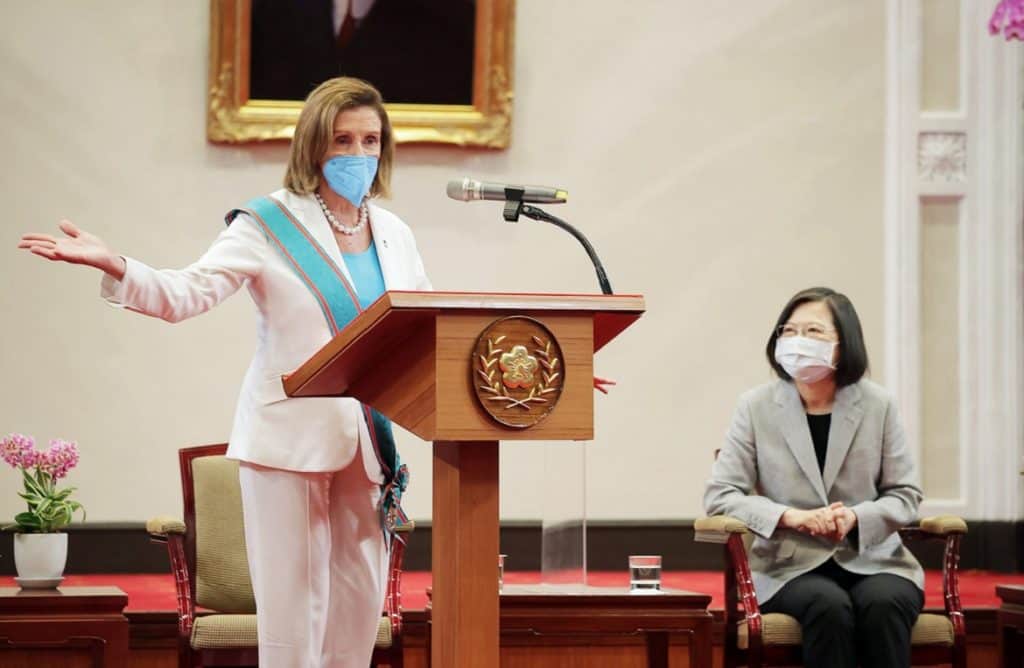World Geostrategic Insights interview with Andrew K.P. Leung on the reason for Pelosi’s visit to Taiwan, China’s response and escalation of the U.S.-China confrontation in the Taiwan Strait, and the unwilling of European and Asian nations from getting involved in the dispute.
 Andrew K.P. Leung is an International and Independent China Strategist based on Hong Kong and Chairman and CEO at Andrew Leung International Consultants and Investments Limited)
Andrew K.P. Leung is an International and Independent China Strategist based on Hong Kong and Chairman and CEO at Andrew Leung International Consultants and Investments Limited)
– A U.S. congressional delegation led by House Speaker Nancy Pelosi has arrived in Taiwan, defying warnings from China, which has threatened a military response. The Biden administration has repeatedly stated that the visit was Pelosi’s personal decision and has publicly assured Beijing that it will mark no change in U.S. policy toward Taiwan and has denounced Beijing’s rhetoric, saying that the United States has no interest in deepening tensions with China. However, Pelosi’s visit is very likely to cause a dangerous escalation in the confrontation between the U.S. and China. In your opinion, what is the reason for Pelosi’s visit? What, if any, is its usefulness for the stability of the region? Can we really believe that Taiwan is in grave and immediate danger and that only a strong vocal support, including high-level visits, and military assistance, from the United States and its allies, can prevent a Chinese military invasion?
Viewed from China, Pelosi’s visit to Taiwan looks more like an attempt to humiliate China and a provocation. Thus, immediately after Pelosi’s arrival, Beijing announced a series of military operations and exercises and other “firm and strong” measures. Xi probably now fears that if Taiwan’s leaders and their U.S. backers do not pay a price for their defiance, he will lose control of the situation, and this would not only undermine Xi’s ability to achieve his long-term goal of reunification, but could also invoke charges of weakness that would undermine his position both inside and outside China. Escalation of the U.S.-China confrontation in the Taiwan Strait is therefore likely, and worst-case scenarios cannot be ruled out. What is your opinion on the foreseeable Chinese actions and the possibility of a direct military confrontation between the U.S. and China?
AL. Before the Pelosi visit, President Xi already warned President Biden that this would be the Rubicon for the One China Policy (OCP) , considering Pelosi’s position as second-in-line for the US presidency. This visit came at the heel of repeated attempts by the US to hollow out the OCP, fielding more and more senior officials to visit Taiwan, creating more and more diplomatic and geopolitical space for the Island by promoting its role in international institutions normally reserved for independent countries, and sending signals to America’s allies to do the same.
Both sides know that a hot war between the US and China is not possible at this point, beware of the coming November. In the US, there are the fateful looming midterm elections when both Pelosi and Biden may see their authority on Capitol Hill topple. In Beijing, there is the National Party Congress set to confirm Xi’s third Term as supreme leader as well as unveiling a new top-leadership lineup, including a possible replacement for retiring Premier Li Keqiang.
Additionally, in a recent testimony to Congress, Chairman of the Joint Chiefs of Staff General Mark Miley confirmed that China does not yet possess full military capacity and confidence to definitively prevail over Taiwan, at least until 2027.
With these calculations, Pelosi thought, with considerable bipartisan support, that this is an opportunity to show the Democratic Party’s political resolve against Beijing’s diktats. She could afford to call Xi’s bluff and poke him in the eye.
As the visit materialized, there is a surging Chinese social media quorus that China has been humiliated and should not have sounded so much sound and fury which could prove empty. This immediate reaction, however, has proven to be naïve.
As a past master of high-level strategy, Beijing has long prepared militarily for all eventualities over Taiwan. We now see highly-coordinated multi-theatre live-fire military exercises swing swiftly into action, literally blockading Taiwan for several days. These serve as a robust warning shot to the US, Taiwan, and Western allies that China can no longer be messed around. The Pelosi saga also gives Beijing the rare opportunity to rehearse on site the dynamics of a possible future invasion to retake the island by force if push ever comes to shove.
What has less been reported is that shortly after the Mark Milley congressional testimony, a study of the Harvard Kennedy School Belfer Center in December 2021 conducted under Professor Graham Allison (author of “The Thucydides Trap”) found that “the Era of US military primacy is over; every domain —air, land, sea, space, and cyberspace is now contested”. The report suggests that “China has the capability to deliver a fait accompli ….. before Washington would be able to decide how to respond”, thanks to its sophisticated A2/AD (Anti-Access/Area Denial) capabilities”.
Nevertheless, Sun Tzu remains the better guide. Beijing has repeatedly stressed that peaceful unification remains the best option, but not to be allowed to scuttle the China Dream of unification by 2049 at the latest, the hundredth anniversary of the founding of the People’s Republic of China.
There is still time to create an inevitable momentum for time-limited negotiations for peaceful unification, perhaps following the example how the former British colony of Hong Kong (whose island portion was ceded by China to Britain in perpetuity under the so-called “unequal treaties”) eventually managed to return peacefully to the Motherland, notwithstanding former British Prime Minister Margaret Thatcher’s resistance and the people of Hong Kong’s initial serious misgivings.
– European governments have maintained a politely silent stance in the China-U.S. quarrel over Nancy Pelosi’s visit to Taiwan, while Russia has backed China, accusing Washington of “destabilizing” the world. What do you think the immediate and long-term implications of Ms. Pelosi’s trip might be for the European geopolitical scene? Could rising tensions between Beijing and Washington divert the United States’ attention from facing the Russian invasion of Ukraine, and could the outbreak of a major security crisis in Asia change the White House’s priorities?
AL. Not only Europe but Asian nations carefully refrain from getting involved in the fray. The South Korea President and his senior adviser declined to meet Nancy Pelosi during her hurricane visit to Seoul. 130 countries across the globe, including the Regional Comprehensive Economic Partnership (RCEP) representing a third of humanity and a third of global GDP, have China as the largest trading partner, compared with 57 for the United States. Apart from some “born-again” anti-China hawks, most European nations are adopting a more cautious and realistic strategy towards China. While wary of China’s influence, most prefer a more nuanced approach, to benefit from the vast China market, soon to become the world’s largest economy, while resisting to hang on to America’s coattail forever.
As for an increasingly ostracized Russia, America’s unilateral coercive tactics have pushed it much closer to China, now identified as America’s only “near-peer” great power rival. Additionally, Russia’s and China’s economies are extremely complementary – one relies heavily on export of surplus energy and agricultural products (like fertilizers) and the other the world’s hungriest customer for these commodities. Moreover, thanks to global warming, more and more Russian land is poised to open up for agricultural production.
As for Ukraine, the White House is now too deep in the mud to extract itself to concentrate on China alone. There is still considerable hubris that America should and can fight a war, now rebranded as a “contest between democracy and autocracy”, on two fronts.
Andrew K.P. Leung (International and Independent China Strategist. Chairman and CEO, Andrew Leung International Consultants and Investments Limited)
(The views expressed in this article belong only to the author and do not necessarily reflect the editorial policy or views of World Geostrategic Insights).







